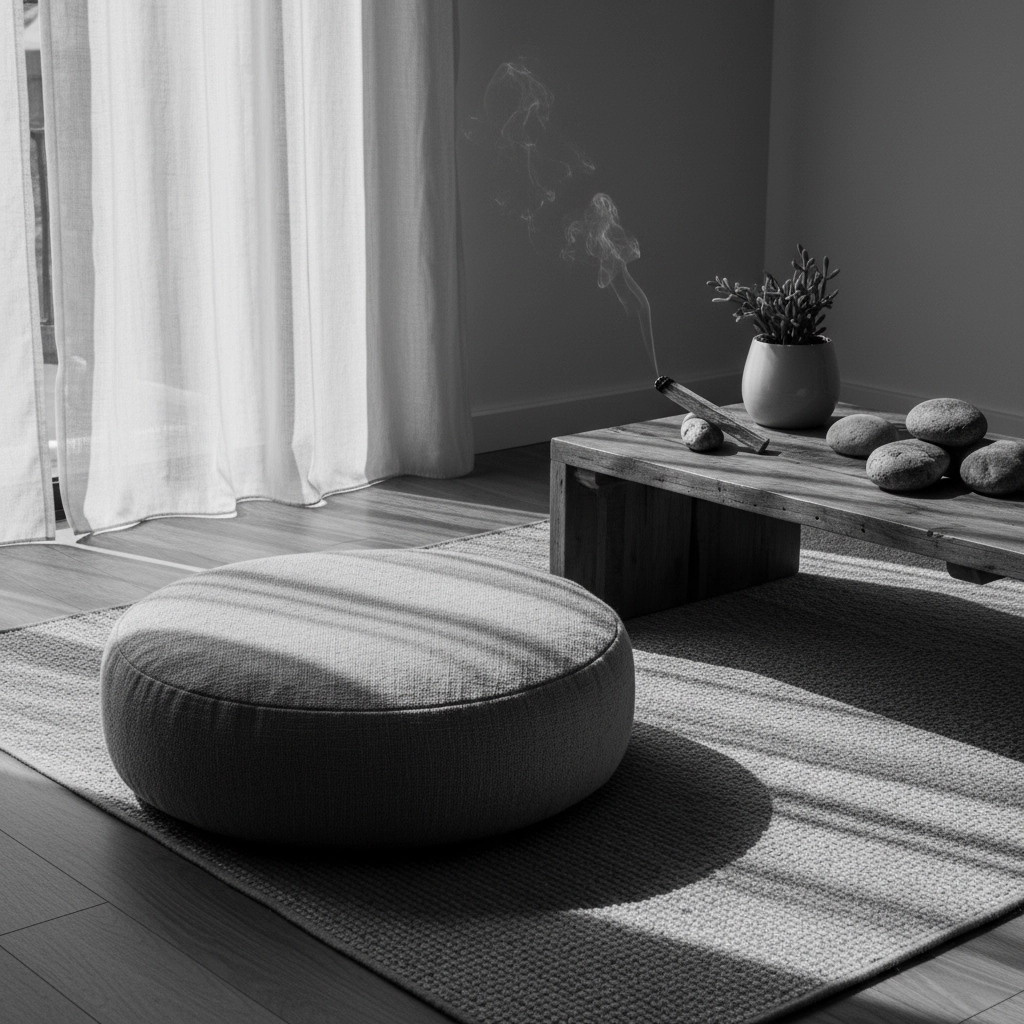In our fast-paced world, we often find ourselves rushing from one task to the next, constantly focused on what's coming up rather than what's happening right now. But what if the secret to genuine happiness isn't found in achieving our next big goal or acquiring something new? What if it's already here, waiting in the quiet moments between our busy schedules, in the warmth of morning sunlight, or in the simple act of savoring our first cup of coffee?
Mindfulness: the practice of being fully present in each moment: offers us a gentle yet powerful way to rediscover joy in our everyday experiences. It's about tuning into life as it unfolds, rather than constantly planning for tomorrow or dwelling on yesterday.
The Foundation of Present-Moment Awareness
At its core, mindfulness is about recognizing that approximately 95 percent of our lives consist of ordinary moments. These aren't the highlight reel moments we post on social media or the major milestones we celebrate with parties. They're the quiet Tuesday mornings, the brief pause between meetings, the feeling of cool air on our skin during an evening walk.
The magic happens when we start paying attention to these moments instead of treating them as mere transitions to something more important. Present-moment awareness invites us to engage fully with whatever is happening right now: whether that's washing dishes, listening to a friend, or simply breathing.
This shift in attention reveals something profound: peace and contentment aren't distant goals we need to chase. They're already here, woven into the fabric of ordinary experience. We just need to slow down enough to notice them.

Morning Rituals: Your Gateway to Mindful Living
There's something almost sacred about morning routines when approached with mindful awareness. The early hours offer a natural opportunity to ground ourselves in the present before the day's demands take over.
Consider transforming your morning coffee ritual into a mindfulness practice. Instead of scrolling through your phone while your coffee cools, try stepping outside with your mug. Feel the weight of the ceramic in your hands, notice the steam rising, and breathe in the rich aroma. Whether you're enjoying our robust French Roast Coffee with its bold, smoky notes, or savoring the deep, complex flavors of our Italian Roast Coffee, let each sip be a moment of full attention.
Listen to the sounds around you: birds singing, wind moving through leaves, or even the distant hum of your neighborhood waking up. These simple observations can anchor you in gratitude and set a peaceful tone for your entire day.
Morning mindfulness doesn't require lengthy meditation sessions or special equipment. It just asks for your presence. Even five minutes of mindful attention to your coffee ritual can create a foundation of calm that carries through busy hours.
Transforming Routine Activities into Sacred Moments
The beauty of mindfulness lies in its accessibility. Every daily activity becomes an opportunity to practice presence and discover joy. Brushing your teeth can become a moment to notice the sensations of bristles against your gums. Washing dishes offers a chance to appreciate warm water and the satisfaction of creating cleanliness.
Even mundane tasks like commuting can be transformed. Instead of viewing your drive as lost time, you might notice the changing light as seasons shift, feel grateful for your car's reliability, or use red lights as cues to take three deep breaths.
The key is approaching these activities with curiosity rather than rushing through them. What textures, sounds, or sensations have you been missing while on autopilot? What small details might bring a moment of wonder to your day?
This mindful approach helps us realize that we don't need to escape our lives to find peace. We can discover sanctuary within ordinary activities by bringing our full attention to them.

Creating Mindful Spaces for Joy
Our environment significantly impacts our ability to stay present and find joy in simple moments. Creating spaces that invite mindfulness doesn't require expensive renovations: it's about intentionality and attention to details that nurture your well-being.
Consider designating a small area of your home as a mindful space. This might be a comfortable chair by a window, a small table where you enjoy your morning coffee, or even just a specific cushion where you sit for a few minutes each day. The key is consistency: returning to the same space helps train your mind to settle more quickly into presence.
Natural elements can enhance these spaces. A small plant, a bowl of smooth stones, or even a simple candle can serve as focal points for mindful attention. When you're sipping your coffee: perhaps our carefully crafted 6 Bean Blend Coffee with its harmonious mix of flavors from around the world: these elements can anchor your senses in the present moment.
Lighting also plays a crucial role. Soft, natural light creates an atmosphere that encourages slower, more contemplative moments. If natural light is limited, consider warm, gentle artificial lighting that feels inviting rather than harsh.
The Gratitude Connection
Mindfulness and gratitude work together like close friends, each strengthening the other. When we're truly present, we naturally begin to notice things we might otherwise take for granted. The way morning light filters through leaves, the comfort of a warm sweater, or the complex flavors in a well-crafted cup of coffee all become sources of appreciation.
Cultivating gratitude doesn't require elaborate practices. It can be as simple as mentally noting three things you appreciate during your morning routine. Maybe it's the reliability of your coffee maker, the fact that you have clean water to brew with, or the quiet moments before your household wakes up.
This practice of grateful attention creates what researchers call an "upward spiral." Noticing good things trains your brain to notice more good things, which in turn generates more positive emotions and greater life satisfaction.

Letting Go of Future-Focused Happiness
One of the most liberating aspects of mindfulness is how it frees us from the trap of postponed happiness. Many of us have learned to think of joy as something that belongs to the future: when we get promoted, when we find the perfect partner, when we have more money, or when the weekend arrives.
Mindfulness gently challenges this pattern by showing us that happiness isn't a destination but a way of traveling. It's available right now, in this breath, in this moment of warmth from your coffee mug, in the satisfaction of completing a simple task with full attention.
This doesn't mean we stop setting goals or looking forward to special occasions. Rather, we stop making our current happiness conditional on future events. We begin to recognize that life is happening now, and joy is available now, even in the midst of ordinary Tuesday afternoon moments.
The Ripple Effects of Mindful Living
As you develop a more mindful approach to daily life, you'll likely notice changes that extend far beyond your personal sense of well-being. Present-moment awareness tends to make us more patient with others, more appreciative of simple pleasures, and more resilient during challenging times.
Negative emotions don't disappear, but they lose some of their overwhelming power when met with mindful awareness. Instead of getting swept away by frustration or anxiety, you develop the capacity to observe these feelings with some perspective, recognizing them as temporary experiences rather than permanent states.
Relationships often improve as well. When you're truly present with others: listening without planning your response, noticing their expressions and energy: connections deepen naturally. The same quality of attention you bring to savoring your coffee can be offered to the people in your life.
Making Mindfulness Sustainable
The goal isn't to be mindfully present every waking moment: that would be exhausting and unrealistic. Instead, think of mindfulness as seasoning you sprinkle throughout your day. A few moments of mindful breathing here, a period of grateful attention there, or a mindful transition between activities can make a significant difference in your overall sense of well-being.
Start small and be consistent rather than attempting dramatic changes. Even thirty seconds of mindful attention to your breathing or one mindful sip of coffee creates neural pathways that make future mindfulness easier.
Remember that mindfulness is called a "practice" for good reason. Like learning to play an instrument or developing physical fitness, it requires patience and gentle persistence. Be kind to yourself when your mind wanders: that's not a failure, it's just what minds do. The magic happens in noticing when attention has drifted and gently returning it to the present moment.
The invitation is simple: slow down enough to notice the life you're already living. Joy isn't hiding in some distant future; it's here, waiting in the warmth of your coffee cup, the feeling of your feet on the ground, and the simple miracle of being alive in this moment.




